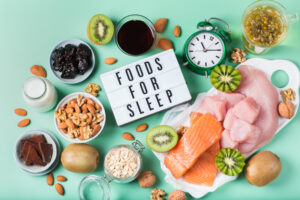 Chamomile flowers are a member of the daisy family, with their bright gold cones that shine in the center of white petals. There are many proven chamomile tea benefits for health.
Chamomile flowers are a member of the daisy family, with their bright gold cones that shine in the center of white petals. There are many proven chamomile tea benefits for health.
With more than one million cups of chamomile tea consumed every day and supplements of chamomile capsules, liquid extracts, ointments, and essential oils in wide use, chamomile is one of the most highly used and research-proven medicinal plants. It has been studied for use with insomnia, heart conditions, colds, inflammation, skin eczema, upset stomach, osteoporosis, anxiety, sore throat, wound healing and more.
Chamomile for Sleep and Insomnia
Chamomile has long been used as a natural sleep aid and insomnia remedy. The powerful oils contained in its flowers provide a calming effect for sleeplessness, nervousness and anxiety. In one study, heart patients were given chamomile tea and fell into a deep sleep. From another study with animals that was done in Japan, calmness and relaxation were increased and the time needed to fall asleep was significantly reduced. Another study showed that chamomile greatly reduces anxiety and increases well-being.
Stomach Conditions Helped by Chamomile
Chamomile is one of the main “go to” herbs for digestive disorders like upset stomach, ulcers, diarrhea and gas. It helps to relax muscle contractions, particularly in the smooth muscles that make up the intestines. In one journal study from Switzerland, the herbal combination of iberis (an herb in the cabbage family), peppermint and chamomile were shown to be effective in the treatment of stomach indigestion, irritation and inflammation.
Eczema and Skin Conditions
Inflammation of the skin is widely treated and remedied by topical chamomile preparations. It has the ability to penetrate into the deeper layers of the skin and help with eczema and other skin inflammations. In a European medical journal, a cream with chamomile extract was tested against a hydrocortisone cream. After a 2-week treatment, the chamomile cream showed a mild superiority in effectiveness over hydrocortisone.
Osteoporosis, Bone Health and Chamomile
In the Journal of Agriculture and Food Chemistry, chamomile extract was studied for its ability to prevent the bone loss that can occur as people age. Chamomile demonstrated the ability to help mineralize bone cells and showed an anti-estrogenic quality. The researchers noted that this may be due to chamomile having a quality as a possible regulator of excess estrogen in the body.
Calcium and Chamomile – A Winning Duo
Calcium is also directly related to our good sleep. In one study, called “The Nutritional Relationships of Magnesium”, the author notes that the type of insomnia associated with a calcium deficiency causes difficulty with falling asleep. This same study says that “Muscle cramps associated with a calcium deficiency often occur at night and without exertion.”
In another study published in the European Neurology Journal, researchers found that calcium levels in the body are higher during some of the deepest levels of sleep, such as the rapid eye movement (REM) phase when most dreaming occurs. This study discovered that disturbances in sleep, especially the absence of REM deep sleep or disturbed REM sleep, are related to a calcium deficiency.
Best Minerals for Sleep: Calcium and Magnesium
One natural insomnia remedy showing good results is Sleep Minerals II from Nutrition Breakthroughs. This sleep aid contains powerful forms of calcium and magnesium, the best known minerals for relaxation and sleep, as well as for restless leg syndrome, stomach health, teenage insomnia and menopause insomnia. The ingredients include vitamin D and zinc and are formulated in a softgel with healthy oils, making them more quickly absorbable than tablets or capsules and providing a deeper, longer-lasting sleep.
Kimberly B. of Troy, Michigan says: “I have been taking Sleep Minerals II for about a month now. I have tried everything out there and this supplement is amazing. I have suffered with insomnia for 2 1/2 years. I have also had restless leg syndrome my entire life and this is the first relief I’ve ever had…gone for a month now.”
Richard P. of Parkville, Maryland says: “The Sleep Minerals are making quite a difference. I was regularly waking up at around 3:00 a.m. and after a few days use my sleep improved quite a lot. I wake up once a night to go to the bathroom, but the great thing is, I then fall back asleep and sleep several more hours. This has been a great improvement.”
Summary for Chamomile and Calcium
Anyone who has a strong allergy to plants like daisies or ragweed (with its tiny green flowers) should start with a very small amount of chamomile, whether using it as a tea, supplement or skin ointment. Most people can gain benefits from chamomile without any reactions. It is one of nature’s most potent herbs and can help with calming insomnia, anxiety, muscle spasms, PMS, skin inflammations, stomach disorders, hemorrhoids, diarrhea, arthritis and more.
As a first line of defense against sleeplessness and insomnia, chamomile and calcium are good bets. Coming from the worlds of herbal and mineral sleep aids, they are normally taken safely without addictive qualities or side effects.
This natural health news is provided by Nutrition Breakthroughs, a publisher of nutrition articles and supplier of effective natural remedies since 2001. Nutrition Breakthroughs makes Sleep Minerals II, the effective natural sleep aid with calcium, magnesium, zinc and vitamin D, and also Joints and More, the natural solution for joint relief, aches and pains, stronger hair and nails and more energy.
Chamomile has long been used as a natural sleep aid and insomnia remedy. The powerful oils contained in its flowers provide a calming effect for sleeplessness, nervousness and anxiety. In one study, heart patients were given chamomile tea and fell into a deep sleep.
Chamomile is one of the most highly used and research-proven medicinal plants. It has been studied for use with insomnia, heart conditions, colds, inflammation, skin eczema, upset stomach, osteoporosis, anxiety, sore throat, wound healing and more.
Chamomile is one of the main “go to” herbs for digestive disorders like upset stomach, ulcers, diarrhea and gas. It helps to relax muscle contractions, particularly in the smooth muscles that make up the intestines. Chamomile also has the ability to help mineralize bone cells and strengthen bones.












